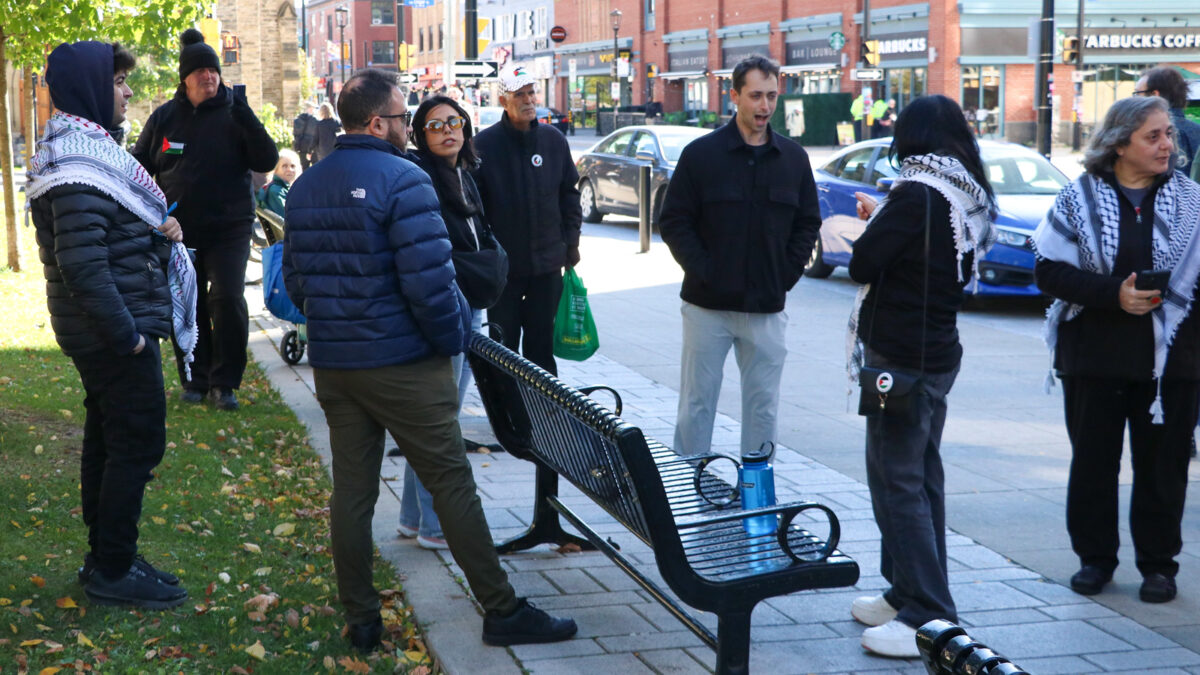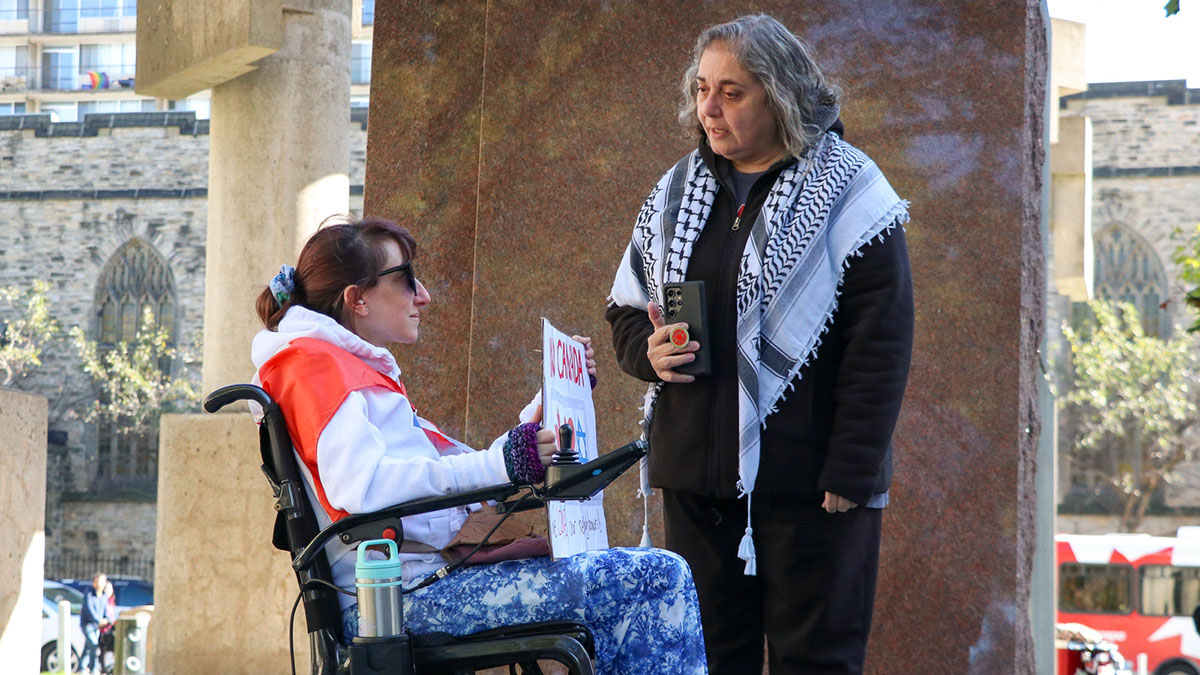More than a year after the Oct. 7, 2023 Hamas terror attack on Israel, reasonable dialogue about the ensuing conflict seems as difficult as ever.
Those who show support for Palestinians risk being branded as terrorist sympathizers. On the flip side, those who criticize some actions of the Israeli government risk being labelled antisemitic.
Some point to the backlash against Capital Pride at the end of the summer as a case study in how fraught the debate has become.
Following Capital Pride’s statement of solidarity with Palestinians, the Jewish Federation of Ottawa withdrew support, claiming the statement was antisemitic and would make Pride unsafe for Jews. Mayor Mark Sutcliffe, along with other sponsors, followed suit.
Mira Sucharov, a Carleton University political science professor specializing in Israeli-Palestinian relations said she believes the statement was balanced and “absolutely not” antisemitic.

“To say that it’s antisemitic, to me, robs the concept of antisemitism of any of its meaning,” she said.
“At most, it was a statement very critical of the Israeli government.”
Sam Hersh, who is Jewish and is coordinator for municipal watchdog Horizon Ottawa, said he doesn’t feel represented by the JFO or pro-Israeli Jewish groups.
“Even if the (Capital Pride) statement was more tame than what it ended up being, they still would have had an issue with it,” said Hersh. “This is the issue with these kinds of groups: they always find an issue with whatever you write if you mention Palestine.”
Some have paid a high price for public support for Palestinians. In December, CBC reported on the “chilling effect” that being pro-Palestinian can have on individuals — often coming at the cost of their job or position. A November statement from the United Nations reported the critiques of the Israeli government must be allowed as the response to Oct. 7 continues.
In the meantime, reported incidents of hate crimes against Muslims and Jews in Ottawa jumped in 2023, with many of the incidents being reported in the final couple months of the year.
So then, what’s a reasonable stance? Is there a reasonable stance?
Sucharov says that those criticizing Capital Pride’s statement for ignoring other issues are an example of whataboutism.
In essence, whataboutism is bringing up other issues when one is being discussed.
“Some people think the fact that this is the first time they’ve issued a statement about any international event means that there is an implicit bias against Israel, the Jewish state,” she said. “So some local Jews feel frustrated by that because they feel, well, there are so many acts of humanitarian or anti-human violence going on now. … Why are they singling out this one?”
How can we talk about it?
“You know, there is no answer,” said Jeremy Borg, VP of Jewish student group Hillel Ottawa. “There is such a divide within the population that civil discourse is impossible.
“I think there are two distinct factions that are diametrically opposed going at each other right now and the rest of society is being forced to pick sides.”
Borg added that, while the Jewish community is not a monolith, outsiders may not be aware of how what they say can impact Jews.
“The statement was incredibly naive in its ideals and Capital Pride alienated a significant portion of people, not only Jews, but people who want an ideology-free Pride event.”
In a statement ahead of Capital Pride’s parade, Somerset Ward Coun. Ariel Troster, who is Queer and Jewish, wrote “Pride is — and has always been political.”
“Capital Pride is speaking from a humanitarian perspective, which holds that all humans are equal and that violence is never a solution,” said Ali Al Ashoor, a poet and recent Carleton journalism graduate. “It’s not about one group attacking another, but about rejecting the act of killing and violence itself.”
Al Ashoor is the recipient of Carleton University’s first Shireen Abu Akleh award, named after the Palestinian-American journalist killed by the IDF in 2022.
“Here in Canada, if we advocate for democracy, human rights, liberal ideologies, reconciliation, and fighting against racism, discrimination, and oppression, we should also support the Palestinian people,” said Al Ashoor.
“By weaponizing antisemitism for political and ideological purposes, they undermine the real dangers of antisemitism in Canada and worldwide by linking anything related to Jewish people with Israel and vice versa,” said Al Ashoor.
Antisemitism and Islamophobia have been on the rise in Canada in the past year as the effects of the war between Israel and Hamas have spread throughout the world.
Hersh says be believes conflating all Jews with Israel is part of what has led to the rise in antisemitic attacks over the past year.
“If the JFO, for example, doesn’t make that distinction, it’s pretty hypocritical to criticize others for doing so. I’m not saying that it’s right, but that is sort of the consequence of consistently saying that we’re one and the same when we’re not.”
As the conflict in the Middle East has expanded, expressing views supporting Israel have also increasingly come under fire.
For example, in September, Artur Wilczynski — then uOttawa’s special adviser on antisemitism — called Israel’s pager attack on Hezbollah, which left thousands dead, “brilliant.”
Following backlash to his posts, Wilczynski resigned his post.
In an email to Capital Current the JFO explained how it understands “the boundary between valid criticism of Israel and antisemitism.”
They say such understanding can be ” can be “guided by the International Holocaust Remembrance Alliance (IHRA) working definition of antisemitism which says that “criticism of Israel similar to that levelled against any other country is not considered antisemitic.”
The line may become antisemitic, the JFO says, when people apply:
• Double standards by requiring behaviour of Israel that is not expected of other democratic nations.
• Deny the Jewish people their right to self-determination.
• Draw comparisons between Israeli policy and Nazi policies.
• Hold all Jews responsible for Israeli government actions.




